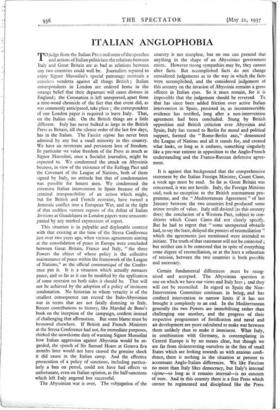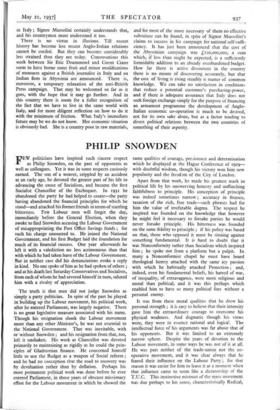ITALIAN ANGLOPHOBIA
TO judge from the Italian Press and some of the speeches and actions of Italian politicians the relations between Italy and Great Britain are as bad as relations between any two countries could well be. Journalists. reputed to enjoy Signor Mussolini's special patronage maintain a
ceaseless vendetta against all things British ; Italian correspondents in London are ordered home in the strange belief that their departure will cause distress in England; the Coronation is left unreported, apart from a nine-word chronicle of the fact that that event did, as was commonly anticipated, take place ; the correspondent of one London paper is required to leave Italy. That, on the Italian side. On the British things are a little different. Italy has never bulked as large in the British Press as Britain, till the silence order of the last few days, has in the Italian. The Fascist regime has never been admired by any but a small minority in this country. We have an inveterate and persistent love of freedom. In particular we value freedom of the Press as much as Signor Mussolini, once a Socialist journalist, might be expected to. We condemned the attack on Abyssinia because, in view of the existence of the Kellogg Pact and the Covenant of the League of Nations, both of them signed by Italy, no attitude but that of condemnation was possible for honest men. We condemned the extensive Italian intervention in Spain because of the criminal irresponsibility of an action which might, but for British and French restraint, have turned a domestic conflict into a European War, and in the light of that reckless venture reports of the defeat of Italian divisions at Guadalajara in London papers were unaccom- panied by any marked expressions of regret.
This situation is in palpable and deplorable contrast with that existing at the time of the Stresa Conference just over two years ago, when various agreements aiming at the consolidation of peace in Europe were concluded between Great Britain, France and Italy, " the three Powers the object of whose policy is the collective maintenance of peace within the framework of the League of Nations," as the official communiqué of the Confer- ence put it. It is a situation which actually menaces peace, and so far as it can be modified by the application of some restraint on both sides it should be. That will not be achieved by the adoption of a policy of insincere condonation. No historian to whom veracity is of: the smallest consequence can record the Italo-Abyssinian war in terms that are not fatally damning to Italy. Recent contributions to history, like Marshal de Bono's book on the inception of the campaign, confirm instead of challenging that affirmation. But some blame must be bestowed elsewhere. If British and French Ministers at the Stresa Conference had not, for immediate purposes, shirked the unwelcome duty of warning Signor Mussolini how Italian aggression against Abyssinia would be re- garded, the speech of Sir Samuel Hoare at Geneva five months later would not have caused the genuine shock it did cause in the Italian camp. And the effective prosecution of a policy of sanctions, including particti- larly a ban on petrol, could not have had effects so unfortunate, even on Italian opinion, as the half-sanctions which left Italy angered but successful.
The Abyssinian war is over. The subjugation of the
country is not complete, but no one can pretend that anything in the shape of an Abyssinian government exists. However strong sympathies may be, they cannot alter facts. But accomplished facts do not change considered judgements as to the way in which; the facts were accomplished,' and the considered judgement of this country on the invasion of Abyssinia remains a gross offence in Italian eyes. So it must remain, for it is impossible that the judgement should be reversed. To that has since been added friction over active Italian intervention in Spain, persisted in, as incontrovertible evidence has testified, long after a non-intervention agreement had been concluded. Stung by British opposition and British criticism over Abyssinia and Spain, Italy has turned to Berlin for moral and political support, formed the " Rome-Berlin axis," denounced the League of Nations and all it stands for, and created what looks, so long as it endures, something singularly like a pre-war entente in opposition to the Anglo-French understanding and the Franco-Russian defensive agree- ment.
It is against that background that the comprehensive statement by the Italian Foreign Minister, Count' Ciano, a week ago must be read. So far as Great Britain was concerned, it was not hostile. Italy, the Foreign Minister said, took no exception to the British rearmament pro- gramme, and the " Mediterranean. Agreement " of last January between the two countries had produced some minor results of value. Italy still desired (as thiS country does) the conclusion of a Western' Pact, subject_ to con- ditions which Count Ciano did not clearly specify. But he had to regret that " some unexpected Obstacle had, to say the least, delayed the proces's of reconciliation which the agreements just mentioned were intended to initiate. The truth of that statement will not be contested but neither can it be contested that in spite of everything some degree of reconciliation, or at the least a relaxation of tension, between the two countries is bOth possible and necessary.
Certain fundamental differences must be recog- nised and accepted. The Abyssinian question is one on which we have our views and Italy hers ; and they will not be reconciled. In regard to Spain the Non- Intervention Committee continues in being, and has confined intervention to narrow limits if it has not brought it completely to an end. In the Mediterranean generally the two Powers are immobilising rather than challenging one another,• and the progress of their respective programmes of fortification and naval and air development are more calculated to make war between them unlikely than to make it imminent. Whit Italy, in combination with Germany, is contemplating in Central Europe is by no means dear, but though we are far from disinteresting ourselves in the fate of small States which are looking towards us with anxious confi- dence, there is nothing in " the situation at present to accentuate Anglo-Italian differences. We like Fascism no more than Italy likes democracy, but Italy's internal regime—so long as it remains internal—is no concern of ours. And in this country there is a free Press which cannot be regimented and -disciplined like the Press in Italy ; Signor Mussolini certainly understands that, and his countrymen must understand it too.
There is no virtue in illusions. Till recent history has become less recent Anglo-Italian relations cannot be cordial. But they can become considerably less strained than they are today. Conversations this week between Sir Eric Drummond and Count Ciano seem to have borne some fruit and minor modifications of measures against a British journalist in Italy and an Indian firm in Abyssinia are announced. There is, moreover, a temporary relaxation of the anti-British Press campaign. That may be welcomed so far as it goes, with the hope that it may go further. And in this country there is room for a fuller recognition of the fact that we have to live in the same world with Italy, and for more diligent reflection on how to do it with the minimum of friction. What Italy's immediate future may be we do not know. Her economic situation is obviously bad. She is a country poor in raw materials, and for most of the more necessary of them no effective substitute can be found, in spite of Signor Mussolini's claims to success in his campaign for national self-suffi- ciency. It has just been announced that the cost of the Abyssinian campaign was £120,000,000, a sum which, if less than might be expected, is a sufficiently formidable addition to an already overburdened budget. How far there is active discontent in the country there is no means of discovering accurately, but that the cost of living is rising steadily is matter of common knowledge. We can take no satisfaction in conditions that reduce a potential customer's purchasing-power, and if there is adequate assurance that Italy does not seek foreign exchange simply for the purpose of financing an armament programme the development of Anglo- Italian economic co-operation is much to be desired, not for its own sake alone, but as a factor tending to divest political relations between the two countries of something of their asperity.















































 Previous page
Previous page